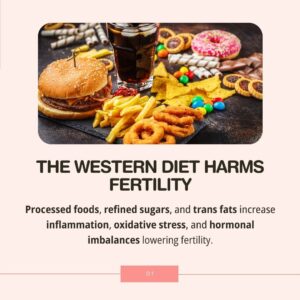Egg Quality Diet: How Your Diet Impacts Egg Quality and Fertility
Have you ever wondered whether the fertility diet can improve your egg quality? The connection between diet and reproductive health is more profound than many realise. Diet influences the supply of essential nutrients and the body’s ability to reduce oxidative stress, a key factor in egg health.
This blog post delves into the science-backed link between nutrition and egg quality.
The Western Diet: A Fertility Disruptor

The Western diet, notorious for its high intake of processed foods, refined sugars, trans fats, and artificial additives, has been linked to various adverse health outcomes, including reduced fertility.
How the Western Diet Affects Fertility:
- Increases Inflammation: A diet high in ultra-processed foods triggers chronic inflammation, impairing ovarian function and egg quality (Alesi et al., 2022).
- Induces Oxidative Stress: Excessive sugar and unhealthy fats contribute to oxidative stress, damaging the body’s cells, accelerating aging and lowering fertility potential (Di Berardino et al., 2024).
- Disrupts Hormonal Balance: The high intake of refined carbohydrates and processed foods leads to insulin resistance with oxidative stress, which can interfere with ovulation and hormone regulation (Papachristoforou et al., 2020).
- Reduces IVF Success: Studies have shown that women who consume large amounts of processed foods and sugary beverages tend to have poorer IVF outcomes and lower-quality embryos (Sanderman et al., 2022).
- Reduced Sperm Quality: Men adhering to a Western diet have shown decreased sperm quality and a higher incidence of reduced sperm motility (Salvaleda-Mateu et al., 2024).
How Nutrition Impacts Egg Quality and Pregnancy Outcomes

One of the biggest challenges in fertility research is that egg quality cannot be measured directly. Unlike sperm, which can be analysed for motility, morphology, and concentration, assessing egg health relies on indirect markers observed in IVF settings.
Key indicators of egg quality include:
- Fertilisation rates – The percentage of eggs that successfully fertilise after sperm injection.
- Embryo quality – The ability of an embryo to develop into a blastocyst with optimal cell structure.
- Live birth rates – The ultimate measure of whether a fertilised egg results in a healthy pregnancy and birth.
Further insights into egg quality can be obtained through Preimplantation Genetic Testing (PGT), which detects chromosomal abnormalities in embryos before transfer. This testing helps identify embryos with the best chance of implantation, reducing the risk of miscarriage and failed IVF cycles.
A recent systematic review and meta-analysis explored how preconception dietary patterns influence pregnancy outcomes in couples undergoing assisted reproductive technologies (ART). The study analysed 13 studies with 3,638 participants and found that adherence to specific diets—particularly the Mediterranean diet and a novel fertility diet—was associated with a higher likelihood of clinical pregnancy and live birth. Notably, the Mediterranean diet was linked to a 25% increase in live birth rates (Kellow et al., 2022).
Another systematic review and meta-analysis investigated whether the Mediterranean diet could enhance fertility outcomes in both men and women struggling with infertility. Analysing data from 11 studies involving over 14,000 participants, researchers found that greater adherence to the Mediterranean diet was linked to improved fertility markers, including higher pregnancy rates, increased live births, and enhanced sperm concentration and count (Muffone et al., 2023).
These findings reinforce that diet plays a crucial role in optimising reproductive health. While we may not have a direct measure for egg quality, evidence from IVF settings strongly suggests that dietary modifications can enhance embryo yield, implantation success, and pregnancy rates—all key indicators of better egg health.
Visit our previous blog post here to learn more about five evidence-based tips to boost fertility naturally. Discover proven strategies to optimise your chances of conception.
Making the Shift to an Egg-Quality Diet

If you’re looking to improve your egg quality, consider making these simple swaps:
- Replace processed snacks with healthier snacks like nuts and seeds.
- Swap refined grains for whole grains like quinoa and brown rice.
- Choose lean proteins like fish, poultry, and legumes instead of processed meats.
- Ditch sugary drinks in favour of caffeine-free teas or fruit-infused water.
- Add more leafy greens and colourful vegetables to every meal.
Bottom Line
- Reduce inflammation and oxidative stress – Cut back on processed foods, sugars, and unhealthy fats to create an optimal environment for egg health.
- Prioritise nutrient-rich foods – Include antioxidants, omega-3s, folate, and zinc to nourish egg cells and support DNA integrity.
- Commit to a Mediterranean-style diet – Whole foods, healthy fats, and balanced nutrition improve egg quality and fertility outcomes, including IVF success.
